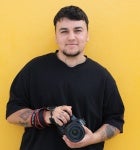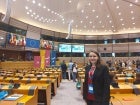Breadcrumb
Stories
Topic
- Show all (1276)
- Women’s rights (-) (15)
- Civil society (-) (12)
- Electoral systems and processes (-) (6)
- Ending violence against women and girls (72)
- Gender equality and women’s empowerment (45)
- Anti-violence interventions (41)
- Gender discrimination (38)
- Gender equality and inequality (38)
- Domestic violence/interpersonal violence (36)
- Access to justice and legal protection (33)
- Legal assistance (29)
- Laws, legislation (26)
- Gender-responsive budgeting (24)
- Primary prevention (24)
- Sexual harassment (24)
- Feminicide/femicide (23)
- Service delivery (23)
- Economic empowerment (22)
- Rape/sexual assault (21)
- Employment (20)
- Shelters (20)
- Rural women (19)
- Entrepreneurship (18)
- Decision-making (16)
- Youth (16)
- Gender power relations (15)
- COVID-19 (14)
- Financing for gender equality (13)
- Gender mainstreaming (13)
- Gender, culture and society (12)
- Men and boys (masculinity) (12)
- Political empowerment (12)
- Access to basic services (11)
- Adolescents (11)
- Businesses and foundations (11)
- Girls (11)
- Human rights (11)
- UNiTE campaign (11)
- Beijing Platform for Action (10)
- Civil society participation (10)
- Peace and security (10)
- Safe Cities and Safe Public Spaces (10)
- Training (10)
- Women with disabilities (10)
- Convention on the Elimination of All Forms of Discrimination against Women (CEDAW) (9)
- Financial resources (9)
- Information and communications technology (ICT) (9)
- Leadership and political participation (9)
- National planning (9)
- Partnerships (9)
- Gender stereotypes (8)
- Governance (8)
- Innovation and technology (8)
- Institutional mechanisms (8)
- Peacebuilding (8)
- Social protection (8)
- Women farmers (8)
- Citizen engagement (7)
- Gender statistics (7)
- Generation Equality (7)
- Government contributors (7)
- Productive resources (7)
- Religion (7)
- Science and technology for development (7)
- Sports (7)
- Trafficking/sexual exploitation (7)
- Women’s movements (7)
- 2030 Agenda for Sustainable Development (6)
- Child marriage (6)
- Communications and media (6)
- Lesbian, gay, bisexual, transgender, intersex (LGBT) rights (6)
- Markets (6)
- Political violence (6)
- Sex-disaggregated data (6)
- Sustainable Development Goals (SDGs) (6)
- Unpaid work (6)
- Accountability (5)
- Gender data production and collection (5)
- Governance and national planning (5)
- Rural development (5)
- Traditional media (5)
- Constitutions and legal reform (4)
- Gender data gaps (4)
- Gender data use and accessibility (4)
- Gender wage gap (4)
- Health (4)
- Intergovernmental processes (4)
- Land and property (4)
- New media (4)
- Poverty (4)
- Public administration (4)
- Rule of law (4)
- Schooling (4)
- Accountability in the UN system (3)
- Climate change (3)
- Crisis response and recovery (3)
- Education (3)
- Environmental protection (3)
- Gender equality indicators (3)
- Health care services (3)
- Inheritance rights (3)
- Living conditions (3)
- Media leadership (3)
- National mechanisms (3)
- National statistical systems (3)
- Parliamentary development (3)
- UN Security Council resolution 1325 (3)
- UN system coordination (3)
- Capacity development (2)
- Coordination, knowledge management (2)
- Disaster risk reduction (2)
- Food security (2)
- Fundamental freedoms (2)
- Fund for Gender Equality (2)
- Harmful practices (2)
- Humanitarian action (2)
- Human rights–based approach (2)
- Macroeconomic policies (2)
- Monitoring and evaluation (2)
- Planning and monitoring (2)
- Sexual and reproductive health and rights (2)
- UN Security Council resolutions (2)
- Urban development (2)
- Åsa Regnér, Deputy Executive Director for Policy, Programme, Civil Society and Intergovernmental Support (1)
- Children’s rights (1)
- Commission on the Status of Women (1)
- Executive Director (1)
- Financial and economic crisis (1)
- Green economy (1)
- Literacy (1)
- Local development (1)
- Maternal health (1)
- Migration (1)
- Monitoring, evaluation and reporting (1)
- Peace processes (1)
- Public sector reform (1)
- Sexuality (1)
- Temporary special measures, affirmative action (1)
- UN Trust Fund to End Violence against Women (1)
Region
Country
1 - 20 of 33 Results
Pagination
Date:
Women in Albania are key drivers of social and economic progress, yet they remain underrepresented in political leadership. To bridge this gap, UN Women Albania, with support from the Swedish Government, trained over 130 women and girls across the country, equipping them with the skills and networks needed to step into leadership roles.
Date:
For International Women's Day, UN Women Albania, in partnership with the Albanian Football Federation, UN agencies, and journalists, hosted a mini football tournament as part of the #ForAllWomenAndGirls campaign. Around 40 women and girls participated in an event, turning the football field into a symbol of progress and change.
Date:
As Albania celebrates three decades since the adoption of the Beijing Declaration, the country continues to make strides in gender equality. An inspiring intergenerational dialogue at a recent event brought together key stakeholders from the Ministry of Health and Social Protection, United Nations Albania, the EU Delegation, and other partners, alongside passionate feminist activists from all generations.
Date:
The May 11, 2025, elections are a key moment to strengthen democracy and build on Albania’s progress in women’s political leadership. While the country ranks 44th globally for women in Parliament, sustaining these gains requires ongoing efforts to ensure participation and prevent setbacks.
Date:
Interview with Flutura Xhabija on attending the Fourth World Conference on Women in Beijing in 1995 and how the Beijing Platform for Action remains relevant today.
Date:
People's Advocate along with the support of UN Women released a report on the killings of women and girls, as well as femicide, revealing that 32 women were killed between 2021-2023.
Date:
10 September 2024 – UN Women in Albania organized in September a five-day Training of Trainers focused on women’s active participation in politics. 14 accomplished trainers were certified on political leadership and candidate training.
Date:
The UN Women campaign was launched as part of the United Nations regional initiative “Youth for Inclusion, Equality & Trust” financed by the UN Secretary-General's Peacebuilding Fund. Inspired by John Lennon’s song “Imagine” the campaign reached more than 4.2 million people through social media in Albania, Bosnia and Herzegovina, Kosovo[1], North Macedonia and Serbia.
Date:
David Cuka, a 31-year-old trailblazer from Tirana, Albania, joined the UN Women's "Imagine" campaign aiming to raise awareness and challenge cultural stereotypes and gender-based discrimination in Albania and the Western Balkans.
Date:
Young peacebuilders from the Western Balkans participated in a two-day training to strengthen their capacities on the Women, Peace and Security (WPS) and Youth, Peace and Security (YPS) agendas.
Date:
Ema Meçaj is a 19-year-old activist from Albania, currently pursuing a degree in medicine at the University of Medicine in Tirana. A dedicated advocate for human rights, gender equality, and climate action, she recently co-moderated the regional youth consultation from December 13 to 14, 2023, in preparation for the 68th session of the Commission on the Status of Women (CSW68). In this Interview, Ema Meçaj reflects on the youth consultations, outlines the key issues for this year’s CSW, and emphasizes the vital role of youth in advancing the gender equality agenda.
Date:
The UN Resident Coordinator’s Office and UN Women Albania co-organized an online training on the Gender Equality Marker (GEM) and the Human Rights Marker (HRM). The overall aim of the training was to ensure that the GEM and HR Marker scoring will be accurate for the upcoming Joint Work Planning cycle, which will cover the 2024-2025 period. The training was also an important step for ensuring the accuracy of markers is instrumental for adequately score UNCT SWAP Indicator 6.1, which verifies whether adequate resources for gender mainstreaming are allocated and tracked.
Date:
A two-day workshop on gender participatory budgeting and community outreach practices brought together civil society organizations, local government representatives, activists, and gender-responsive budgeting experts from Albania and North Macedonia.
Date:
Toxic masculinities, rigid gender stereotypes, hate speech and media representation of traditional gender roles increase the risk of violence, particularly against women, which is considered to be the most widespread form of violence throughout the region – according to a new research supported by UN Women.
Date:
Fake news, misinformation, and hate speech are causing significant harm to mental health, exacerbating social divisions, and eroding trust in public institutions throughout the Western Balkans. Marginalized groups, particularly women and girls, are frequently targeted by hate speech. Of particular concern is the role of social media, which has become a fertile breeding ground for disinformation.
Date:
130 youth participated in UN Women consultations organized in Albania, Bosnia and Herzegovina, Kosovo*, Serbia, and North Macedonia.
Date:
The local government elections on 14 May are an important opportunity to strengthen local democracy in Albania, and to consolidate past achievements in promoting women leadership in decision-making. Ahead of the start of the campaign, the United Nations in Albania reached out to political party leaders, advocating for women’s full and meaningful participation in local elections, and presenting a set of recommendations in three key areas.
Date:
Around 20 journalists and media experts joined the media forum on "Media and Violence Against Women in Politics and Elections" organized prior to Albania’s Local Elections taking place on the 14th of May, by UN Women and its partner organization "Together for Life". Participants in the event discussed the various challenges faced by women in politics and elections and the crucial role of the media in addressing them.
Date:
Verie Tahiraj is a strong and determined woman, who has been supporting her family through economic hardship for years. When the opportunity to secure a source of income by becoming a part of the artisan value chain presented itself, she seized it without hesitation.
Date:
A week-long events tackle gender discrimination in Albania with participants asking for equal representation in every space.
1 - 20 of 33 Results

















